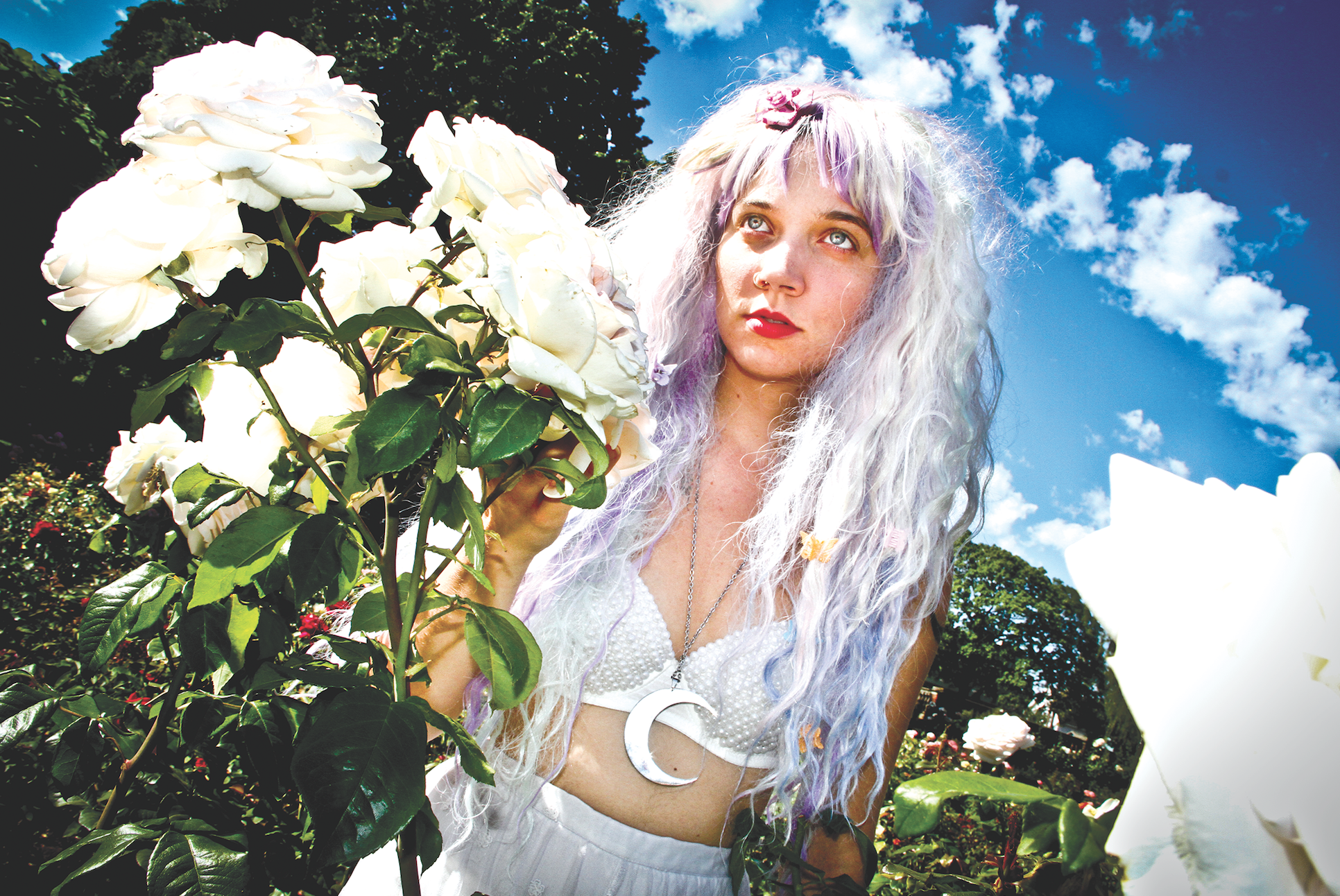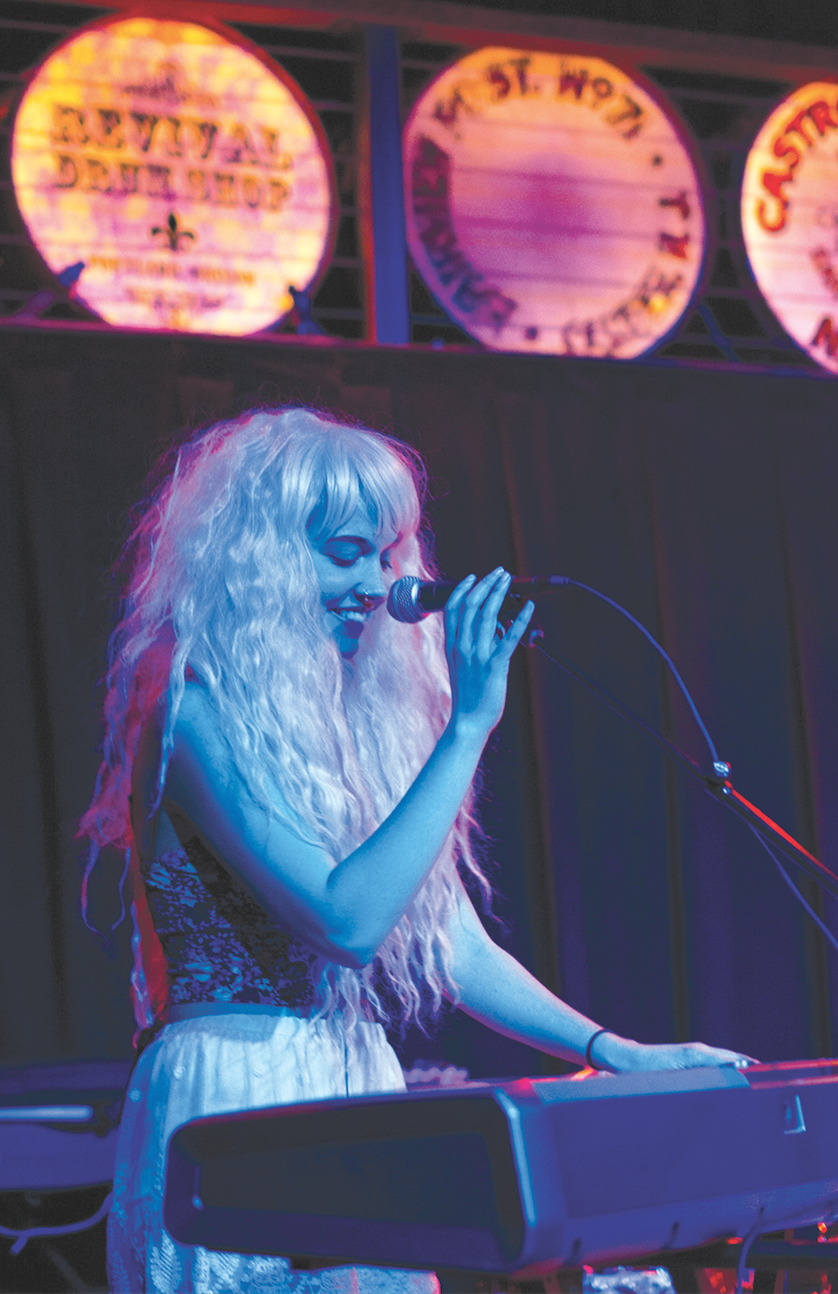Coco Columbia


Coco Columbia is a dream, a vehicle, a magic machine where the girl beneath the wig transmutes her real world fears into the raw stuff of courage, much as an alchemist alters gravel into gold. This fey creature, the Queen of Blossom Flowers, though spun from an all-too-human mind, builds music that is otherworldly.
Her newest album, When the Birds Begin to Walk, pulls the listener down mesmeric pathways, jarring them with sudden flashes of blackness before leading them back to sunlight and yellow, butterfly filled fields. It is a departure from our day, and a fascinating glimpse of a multi-hued spirit. Catch the album release show at Doug Fir, Aug. 17 with Sama Dams and Moorea Masa.
Eleven: So Coco Columbia is not your real name?
Coco Columbia: I just want that to be my stage name, because I don’t want my actual name on anything. When you do that there’s always confusion though, because we are a band, but everyone thinks Coco Columbia is a band. My band is a band, but I’ve had different people in the band. I’m doing all the music and the character.
11: If you conceive of Coco Columbia as a personality that you’ve created, how would you characterize her? Does she inhabit your songs or is it just a performer in a wig?
CC: It’s a vibe. I’ve always liked the idea of an alter ego. For me, if she is my alter ego, she is this person who is me, and has my personality, but devoid any of the fear. And still has my flaws. Amplified, but void of fear. It’s like if I had no fear regarding anything in my life, how would I approach things completely differently? And so she’s who I imagine the quirky superhero version of myself is, if I wasn’t a scared little child in my hermit shell all the time.
11: You’re physically inhabiting this character in real life though, mostly onstage or when you’re writing music. It could be argued that when you’re hanging out with Coco Columbia, or hanging out as Coco Columbia, you are able to be the girl that is your fearless alter ego. You get to be that person.
CC: But it doesn’t feel like that you know. My biggest thing right now, for the last year and a half, has been “fake it till you make it.” I love that so much. I think that my whole life I’ve been so afraid of everything and I’ve just been so insecure, and I haven’t really fit into these certain groups of people, these certain environments that I try really hard to fit into. It just didn’t work out. I’ve just had a lot of bullshit, like not being taken seriously by people. So this is kind of me turning around and kind of obnoxiously saying I’m going to represent and embody this thing that’s almost like a “fuck the haters” type of thing, and I hate to put it that way. That’s the worst way to put it. But it’s what you would be like if you actually didn’t give a fuck. Which, everyone gives a fuck. Even if you say you don’t, you obviously do. If you’re making anything and putting it out into the world, you want it to be received well.
11: Otherwise you wouldn’t put it in the world.
CC: Yeah, you’d just make it for yourself. Sometimes I think it’d be cool for everyone, as an exercise, like say you were going to see a counselor, and they have you do all these different exercises learning how to deal with your shit and not hate yourself, if one of the exercises could be creating an alter ego, and then deciding to fake that alter ego until you feel like you got to that point where you can almost embody it, like a real thing, so it didn’t feel fake to you.

11: Well how do you feel? Does it feel like you’re blurring some sort of line between who you are as Dana and who you are as Coco?
CC: It doesn’t feel like I’m there yet, but it also doesn’t feel like it’s fake. It felt really fake to me at first. So I was almost like, “this is stupid, this is a fake bullshit thing I’m doing.” But then later I was like, “No this is awesome, this is what I want to be, and so I’m gonna just keeping pushing this along until it feels natural.” And what’s awesome about that is its started to feel more natural over time, which means its working, the faking it thing is turning into not faking it anymore. It’s just growing or something.
11: You exist between these two worlds of modern jazz and modern pop. How does it feel to be in a rather uncharted place, existing between two different scenes? Do you feel drawn to one scene over the other?
CC: I grew up playing the drums and went to school for jazz for a little while, and I definitely wanted to be a funk or jazz drummer for a bit. But I’ve always been drawn to pop music, and I’ve always had lofty goals, but I’m aiming for pop. I don’t mean straight-up pop. Anything that has vocals in it I consider pop in my head. There’s pop music and instrumental music. There’s like jazz and classical and world music, and that’s instrumental, and then there’s music with vocals, which kind of mostly resides in the pop world. So when I say pop that’s what I mean. In my eyes I want to be in the pop world, and I really don’t want to be in the jazz world. I got a lot more jazz and soul labels from my first album because it’s not really rock at all, and this one’s way more rock. I’ve just decided to embrace any labels that people give us because I think it just helps, though I am trying to push the pop band thing. This album seems more like prog rock to me. But yeah to answer your question, I did feel really split between the two scenes. I’m cool with being accepted into the jazz scene, but I also feel not totally accepted by the pop scene yet. It was really hard for me to book shows at first because I think that we didn’t fit with a lot of bands.
11: In a couple of the songs, like “9 Steps” and “Black Flower,” there’s some interesting moments where you flip suddenly between these lighter melodies and harmonies, that are then juxtaposed with these intense, chaotic, dissonant jazz breakdowns. Why do you choose to put these two very contrasting parts together so closely in these songs?
CC: At some point I decided I wanted to musically and visually represent this character and, also, that’s how I feel all the time. I’ve always had a little bit of a bi-polarish personality type, and everything in my whole life has felt either “fucking wanna die” or “fucking amazing.” And it’s every other day, or it’s every two days. I think that I like styles of music that are super raw and angry and emotive and big, and I also love big, beautiful, happy soul melodies. And so I decided I wanted to try and mix those two elements. I like when songs go places that you’re not expecting them to go, even if people don’t like it. And I felt that with some of the songs, I wanted them to still be somewhat relatable. But I also thought that maybe you wouldn’t like it when you first heard it, but I hope that it would be something that would grow on you. Or that in time you would understand the emotional intent behind it. It’s mostly just emotionally driven.
11: How did you find songwriting?
CC: About three years ago when I dropped out of music school I was not sleeping and not being productive, and that was when I found songwriting. And so I slowly started teaching myself how to sing, how to write songs, how to record stuff, how to make beats. Right when I found that, I almost completely stopped playing drums. It was the most satisfying outlet. I feel like with song writing you get the full package. You’re playing an instrument, you’re singing, you’re writing the lyrics and parts, you have like a theme or brand or vibe in mind. You get all the satisfaction of all the things you want to do creatively, jam packed into one thing. So right at that time I went on this quest to heal all my bullshit, and I found songwriting, and nothing is now as wonderful to me as when I finish writing a song that I feel accurately represents how I was feeling. And the hope after that is for that song to be relatable to someone else, like that “horrible fucking sinking tornado I want to fall into the depths of hell” feeling and they feel you on that, they feel that in the music, and that heals them a little bit, that’s the goal for me. For other people to feel better. Because that’s what it’s done for me.
11: So regardless of the ins and outs, the ups and downs, it’s a message of hopefulness for those who are suffering?
CC: Yeah. I found what I prefer, instead of “let’s try to be positive, let’s pretend things are OK,” is honesty. I think that when you’re honest with people about how you’re feeling then they’re almost never going to respond badly.»
– Ethan Martin




